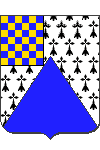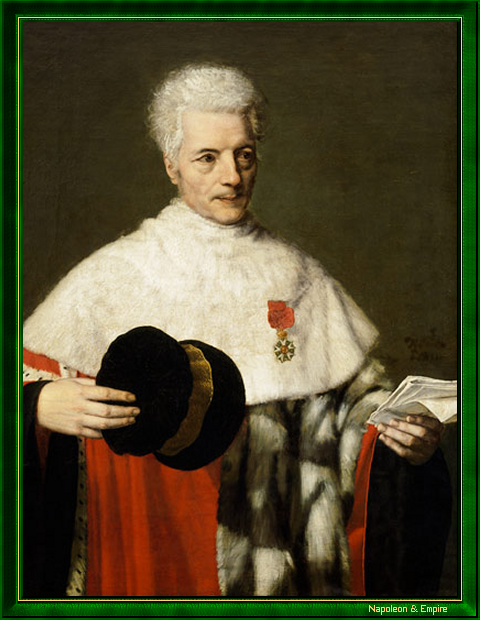Philippe Antoine Merlin, a.k.a. Merlin de Douai
Count of the Empire
Pronunciation:

Philippe Antoine Merlin, born on October 30, 1754 in Arleux, Cambrésis, studied in Douai, earning his nickname (intended to distinguish him from Merlin de Thionville).
A lawyer at the Parliament of Flanders, he defended Pierre-Augustin Caron de Beaumarchais and President Jean-Baptiste Mercier Dupaty. A supporter of the Revolution, he was elected deputy to the Estates General in 1789, and played an active role throughout the revolutionary period in the design and implementation of the regime's new legal and legislative framework.
He was elected to the Conseil des Anciens on 23 Vendémiaire, An IV, but soon had to devote himself to another post, that of Minister of Justice, entrusted to him by the Directoire, before taking charge of the newly-created Ministry of Police. After 18 fructidor an V, he replaced François Barthélemy and became one of the five Directors, but was forced to resign under the pressure of public discontent, four months before the coup d'état of 18 Brumaire.
A member of the Institut de France since December 10, 1795 in the Moral and Political Sciences class, Merlin de Douai was elected a member of the Académie française on January 28, 1803, when it was reorganized, and occupied the armchair of Marshal Prince de Beauvau.
Under the First Empire, he returned to prestigious positions in the judiciary, first as Government Commissioner to the Court of Cassation, then as Attorney General to the same court. Napoleon I appointed him successively State Councillor for life, Chevalier de l'Empire, Comte de l'Empire, member of the Committee for Crown Affairs, Grand Officer of the Legion of Honor and Commander of the Order of Reunion.
Removed from office during the Restoration, he was recalled by Napoleon during the Hundred Days. On the return of the Bourbons, he wanted to settle in America, but his ship washed up in the port of Flushing, so he stayed in Holland, returning to France only after the revolution of 1830. The doors of the Institut de France, of which he had been a member since its foundation, were reopened to him when it was reconstituted in 1832.
Merlin de Douai died in Paris on December 26, 1838, and was buried in the Montparnasse cemetery .
"Merlin de Douai" by Hilaire Ledru (Oppy 1769 - Paris 1840).

Completely abandoned for a long time, the "perpetual" concession of Merlin de Douai's tomb should have been raised in 2011.